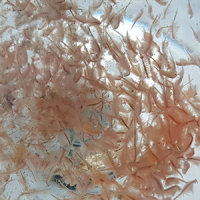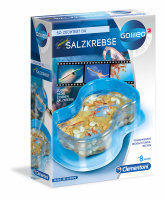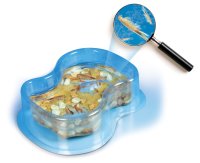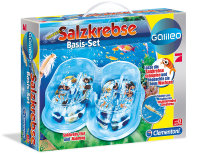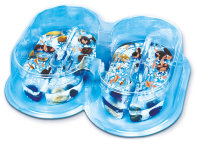Sea Monkeys
Sea Monkeys |
|
|---|---|
Saltwater crabs Fawn crabs in salt water - primeval crayfish
What are salt crabs?
Saltwater crabs are also primeval crayfish. They are also called saline crabs. The difference to all other prehistoric cancers, such as Triops, Faerie crabs or shellfish scrapers, however, is that saltwater crustaceans are not freshwater crayfish, but are in the saltwater. These animals are found in nature in many saline waters worldwide. Similar to fish, these crabs have gills to breathe. The most common species sold as saltwater crayfish is Artemia. Artemia saltwater crabs are sold mainly as feed for feeding fish. Often, only their nutrient-rich eggs (nauplii) are used for this purpose. Flamingos love Artemia, flamingos would not eat Artemia saltwater crayfish if they were not pink, but white. The salt crabs were mainly known through the magazine YPS, in which they were added several times as a side dish.
Saltwater crayfish - reproduction
Very amazing is the salt crustacean laying two different types of eggs. The normal eggs and the permanent eggs. Nature has developed a sophisticated system. When the salinity in the lake increases It signals the primeval cancer that dehydration is imminent. Only then will the permanent eggs be released from him into the mud. The prerequisite for the eggs to survive in the mud for several years is, of course, sufficient oxygen supply.
Saltwater crabs - development
Salt crab feeds, like most other primeval crayfish, by filtering algae and other particles out of the water. Even yeast is on the menu for this cancer. Saline crabs are relatively small and are usually 1 - 2 inches in size. Fully grown they are already after 3 to 4 weeks. The life expectancy is about 2 - 3 months. You can grow salt crabs easily in a small plastic basin. Once the animals are 3 days old, they can be fed at intervals of every two weeks. Depending on the salinity and food, the color of the crayfish may vary slightly.
Saltwater crabs Fawn crabs in salt water - primeval crayfish
What are salt crabs?
Saltwater crabs are also primeval crayfish. They are also called saline crabs. The difference to all other prehistoric cancers, such as Triops, Faerie crabs or shellfish scrapers, however, is that saltwater crustaceans are not freshwater crayfish, but are in the saltwater. These animals are found in nature in many saline waters worldwide. Similar to fish, these crabs have gills to breathe. The most common species sold as saltwater crayfish is Artemia. Artemia saltwater crabs are sold mainly as feed for feeding fish. Often, only their nutrient-rich eggs (nauplii) are used for this purpose. Flamingos love Artemia, flamingos would not eat Artemia saltwater crayfish if they were not pink, but white. The salt crabs were mainly known through the magazine YPS, in which they were added several times as a side dish.
Saltwater crayfish - reproduction
Very amazing is the salt crustacean laying two different types of eggs. The normal eggs and the permanent eggs. Nature has developed a sophisticated system. When the salinity in the lake increases It signals the primeval cancer that dehydration is imminent. Only then will the permanent eggs be released from him into the mud. The prerequisite for the eggs to survive in the mud for several years is, of course, sufficient oxygen supply.
Saltwater crabs - development
Salt crab feeds, like most other primeval crayfish, by filtering algae and other particles out of the water. Even yeast is on the menu for this cancer. Saline crabs are relatively small and are usually 1 - 2 inches in size. Fully grown they are already after 3 to 4 weeks. The life expectancy is about 2 - 3 months. You can grow salt crabs easily in a small plastic basin. Once the animals are 3 days old, they can be fed at intervals of every two weeks. Depending on the salinity and food, the color of the crayfish may vary slightly.

